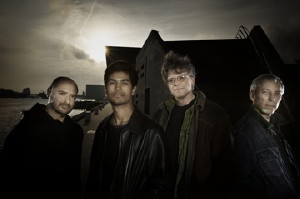Special Reports
Case Study No. 3: Kronos Quartet
 Under 30 Project: Crowd-funding at the grass roots
Under 30 Project: Crowd-funding at the grass roots 
Issue: In its 30th-anniversary year in 2003, San Francisco's Kronos Quartet created the Under 30 Project to support the creation of new work and to develop artistic relationships with the next generation. To date they have kick-started the careers of four young composers—Alexandra du Bois, Felipe Perez Santiago, Dan Visconti, and Aviya Kopelman. In fall 2011, Kronos sought to launch another Under 30 project.
Goals: To raise money using online tools for the new commission, which amounts to a four-figure fee and travel for consultation, rehearsing, recording, and touring in 2013-14. And to use the project to deepen the group's relationship with non-classical fans. "Many people are not even aware that Kronos is non-profit," says Christina Johnson, the group's communications manager.  "Kronos has fans who think of them as the musicians on the soundtracks of Darren Aronofsky films like Requiem for a Dream, with music by Clint Mansell, founder of the band Pop Will Eat Itself. We wanted to get that larger group engaged."
"Kronos has fans who think of them as the musicians on the soundtracks of Darren Aronofsky films like Requiem for a Dream, with music by Clint Mansell, founder of the band Pop Will Eat Itself. We wanted to get that larger group engaged."
Digital component: Kronos launched its fund-raising campaign on Dec. 31, 2011, using Kickstarter.com a website for individuals and organizations seeking to attract backers for creative projects such as art installations, tech devices, recordings and theatrical endeavors. They do so using often-quirky incentives. Kronos sought pledges from $10 (incentive: Kronos sticker and pin) to $5,000 (a dinner with Kronos, MP3 downloads, a phone call, a personal postcard from the road, a special mix CD, collectible LP, backstage and soundcheck passes). While a recent video game project (Double Fine) raised more than $1 million within a few hours on Kickstarter.com Kronos's aims were modest by comparison—$10,000 in 30 days—although $10,000 is at the high end for Kickstarter classical music campaigns.
Obstacles: Kickstarter.com forbids charity and cause funding, promises of financial return and "fund my life" projects. Otherwise, Johnson says, "It was as easy as setting up a Facebook profile."
Money: The fee is 5% of all campaigns that meet their goal. (If the goal isn't met, nobody gets anything.) There is also a processing charge (through Amazon Payments) of 3-5%. In late February, Kickstarter co-founder Yancey Strickler said that Kickstarter is on track to distribute more money to creative projects in 2012 than the National Endowment for the Arts.)
Time & Staffing: Kickstarter advises fund-seekers they'll raise more money if they upload videos and stay in touch with participants. "That's where the time and energy comes in," says Johnson. She edited and posted videos of previous Under 30 composers, created interviews with Kronos members and kept up the project's blog. "I was constantly coming up with new ways to be talking about the project." She's still at it, creating MP3s and otherwise fulfilling promises to people who made pledges.
Measuring Results: Kronos beat its $10,000 goal and raised $13,200 from 162 backers by the closing date—Jan. 31, 2012—with 19 people donating $10 at the low end, one at $1,000, and most in the $25-$150 range. But the campaign was always about more than the dollars, Johnson says: "At the same time we were cultivating followers. Of the 162 backers, the majority had never given to Kronos before, either online or by snail mail. We want to help these relationships continue to grow."
Another quartet recently topped Kronos's numbers: Brooklyn Rider launched a Kickstarter campaign in mid-January for help producing an album called Seven Steps. With a goal of $30,000, the group raised $50,656 from 285 backers. At the time, 41 classical music campaigns were underway.

Nancy Malitz has been writing about the intersection of the arts and technology for most of her career. She developed some of Gannett Media's first newspaper websites and worked on strategic projects for media change.
Additional Case Studies
Detroit Symphony Orchestra’s Live from Orchestra Hall: Streaming as status quo
New York Philharmonic’s Le Grand Macabre: YouTube promotion, underground style

WHO'S BLOGGING

Law and Disorder by GG Arts Law
Career Advice by Legendary Manager Edna Landau
An American in Paris by Frank Cadenhead





 FEATURED JOBS
FEATURED JOBS

 RENT A PHOTO
RENT A PHOTO


